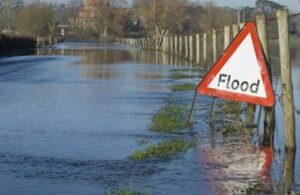Frequently Flooded Allowance: Funding for repeatedly flooded communities
£100 million of funding for areas in England that have suffered repeated flooding

Floods Minister Rebecca Pow has today (Wednesday 5 April) announced the first communities in England to receive better flood protection as part of the government’s £100 million Frequently Flooded Allowance to protect areas which have been affected by repeated flooding.
The first 53 projects announced today will be allocated more than £26 million in total, better protecting more than 2,300 households and businesses across the country.
Communities that will be better protected include those in Worcestershire, which faced severe flooding with Storm Christoph in 2021, and Cumbria, whose residents suffered major flooding from Storm Desmond in 2015 and Storm Ciara in 2020.
It will also better protect properties in the Calder Valley, which was devastated by flooding when it was hit by both Storm Ciara and Storm Eva in 2015.
The allowance targets communities where 10 or more properties have flooded twice or more in the last 10 years. These communities are often smaller and can face barriers to access funding due to the relative complexity and cost of building flood defences compared to the size of the community.
Environment Minister Rebecca Pow said:
We know only too well the devastating impact that flooding can have on communities and businesses, as we face more extreme weather brought about by climate change.
I am determined that we do whatever we can to prevent flooding that affects so many towns and villages across the country.
This much-needed funding will go a long way to support those whose homes and livelihoods are repeatedly threatened by flooding and forms a key part of our record £5.2 billion investment by 2027 to protect communities in England better.
Caroline Douglass, Executive Director for Flood and Coastal Risk Management at the Environment Agency, said:
Increased flooding is just one of the impacts of climate change we are seeing in the UK and around the world. Protecting people and communities is our top priority as we look to tackle this challenge.
The funding announced today will help better protect homes and businesses at risk from repeated flood incidents across the country.
The Environment Agency’s strong track record in delivering flood defence schemes means we have better protected 374,000 homes since 2015.
Projects will improve resilience through a mixture of hard engineering flood defences and natural flood management measures. The allowance also supports the installation of property flood resilience (PFR) measures such as flood doors and barriers, meaning more homes will be better protected in communities where traditional defence schemes are not always viable.
The ring-fenced funding is part of a record £5.2 billion investment in flood defences to protect communities across England better.
Since the start of the current £5.2 billion investment programme (2021-2027), we have already better protected more than 35,000 properties. This follows our successful delivery of the previous £2.6 billion investment programme between 2015 and 2021, which better protected more than 314,000 homes across England.
See below for a full list of projects to receive funding:
-
Alconbury Flood Alleviation Scheme Stage 2
-
Brighton & Hove City Council Surface Water Management Feasibility Study
-
Bingley and Shipley Property Flood Resilience Study
-
Bledington Flood Alleviation Scheme
-
Brighouse Flood Alleviation Scheme
-
Burrow Beck Conveyance Improvements
-
Carlisle Appraisal Package Appleby Town Centre
-
Chard Flood Alleviation Scheme
-
Cocker Beck, Lowdham, Flood Alleviation Scheme
-
Dufton Close Feasibility Study
-
Earby Flood Alleviation Scheme Phase 3, Earby Beck
-
Eardisland Flood Alleviation Scheme
-
Erringden Hillside
-
Falmouth Integrated Urban Drainage Management
-
First Avenue Flood Alleviation Scheme
-
Flood Risk Reduction Schemes 2 - Copley Village Flood Alleviation Scheme
-
Flood Risk Reduction Schemes 2 - Cottonstones near Lumb, Calderdale
-
Flood Risk Reduction Schemes 2 - Railes Close between Luddenden and Midgley
-
Greyfriars Community Flood Risk Management Scheme
-
Hebden Bridge Flood Alleviation Scheme
-
Ilminster Flood Alleviation Study
-
Intake, Flood Risk Management Scheme
-
Irwell Vale to Chatterton
-
Langstone (Havant) Flood and Coastal Erosion Risk Management Scheme
-
Larkspur Close Integrated Urban Drainage Scheme
-
Lavendon Flood Alleviation Scheme
-
Leintwardine and Walford Property Flood Resilience
-
Lindale Road Grange over Sands
-
Lipson Vale Phase 1, Trefusis Park (South West Water Integrated Urban Drainage Modelling)
-
Little Bollington River Bollin Property Flood Resilience
-
Market Weighton Flood Alleviation Scheme
-
Natural Flood Management Upstream of Cirencester
-
Northumbria Integrated Drainage Partnership - Redcar (Yearby, Kirkleatham & Low Farm Drive, and West Dyke Road) Flood Alleviation Scheme
-
Northumbria Integrated Drainage Partnership - Saltburn (Princes Road & Marske Road) Flood Alleviation Scheme
-
North Road, Holme Village Flood Alleviation
-
Pallion Flood Alleviation Scheme
-
River Teme, Tenbury Wells Community Flood Alleviation Scheme
-
Rolleston Brook Flood Alleviation Scheme, Staffordshire
-
Ruislip Park Wood and Pinn Meadows
-
Severn Stoke Flood Alleviation Scheme, River Severn
-
Skipton Road
-
Small Communities Property Flood Resilience Scoping
-
South Cave Flood Alleviation Scheme
-
Stony Stratford Flood Alleviation Study
-
Stubbing Holme Road
-
Tenbury Wells Integrated Flood Solution
-
Toronto Close Flood Alleviation Scheme
-
Undefended Properties in the Ironbridge Gorge - Individual Property Protection
-
Upper River Piddle Catchment Flood Risk Management Scheme
-
Walsden Flood Alleviation Scheme
-
West End Road, St Helens
-
Whitley Brook Flood Reduction Scheme
-
Williton Flood Alleviation Study